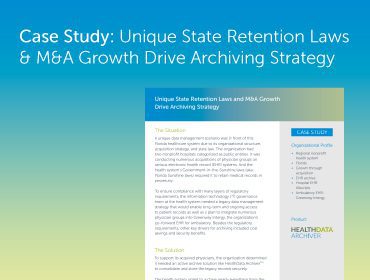
The Situation
A unique data management scenario was in front of this Florida healthcare system due to its organizational structure, acquisition strategy, and state law. The organization had two nonprofit hospitals categorized as public entities. It was conducting numerous acquisitions of physician groups on various electronic health record (EHR) systems. And the health system’s Government-in-the-Sunshine laws (aka: Florida Sunshine laws) required it to retain medical records in perpetuity.
To ensure compliance with many layers of regulatory requirements, the information technology (IT) governance team at the health system needed a legacy data management strategy that would enable long-term and ongoing access to patient records as well as a plan to integrate numerous physician groups into Greenway Intergy, the organization’s go-forward EHR for ambulatory. Besides the regulatory requirements, other key drivers for archiving included cost savings and security benefits.
The Solution
To support its acquired physicians, the organization determined it needed an active archive solution like HealthData Archiver® to consolidate and store the legacy records securely.
The health system opted to archive nearly everything from the acquired systems. It was important for clinicians and physicians to have a fresh start in the EHR going forward, as well as the ability to access the legacy records through the archive.
The archiving projects came with unique variables based on the types of specialty practices being acquired and the legacy applications involved. The team from Harmony Healthcare IT archived EHRs like Allscripts Touchworks, Greenway, athenaNet, UroChartEHR and RemedyEHR. With each acquisition, the Consolidated Clinical Document Architecture (CCDA), if available, would be migrated to the go-forward EHR and the entire record set loaded into HealthData Archiver®. This retention plan would provide the health information
management (HIM) team with a means for historical patient records to remain accessible, usable, secure and compliant long term.
Archiving was a cost-effective solution, as the organization found it was more expensive to keep paying for EHR maintenance/upgrades and for the staff expertise to keep legacy systems operating. Not to mention, there are security risks in keeping so many legacy systems up and running.
With Harmony Healthcare IT’s support and its HealthData Archiver® active archive solution, the health system is able to meet its data management transparency and agility requirements, which also sets the stage for the organization to comply with the federal requirements of the 21st Century Cures Act.
Benefits & Results
Access
Clinicians are able to access the legacy records in HealthData Archiver® for better patient care.
Record retention in perpetuity
Compliance meets its unique record retention requirements based on state, medical condition, and other requirements.
Increased security
The security team, by decommissioning legacy systems no longer supported by the vendor, fortifies its defenses against cybersecurity attack.
Cost savings
Finance benefits from HealthData Archiver® by removing legacy system maintenance costs for software, hardware, and administration labor burden.
Streamlined application portfolio
The IT organization consolidates its application footprint by following a decommissioning schedule based on legacy application contract renewals, account receivables wind-down schedules, security risks, new application go-live dates and data conversion plans.






